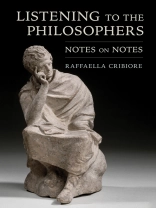Listening to the Philosophers offers the first comprehensive look into how philosophy was taught in antiquity through a stimulating study of lectures by ancient philosophers that were recorded by their students. Raffaella Cribiore shows how the study of notes—whether Philodemus of Gadara’s notes of Zeno’s lectures in the first century BCE, or Arrian recording the Discourses of Epictetus in the second century CE, or the students of Didymus the Blind in the fourth century and Olympiodorus in the sixth century—can enable us to understand the methods and practices of what was an orally conducted education. By considering the pedagogical and mnemonic role of notetaking in ancient education, Listening to the Philosophers demonstrates how in antiquity the written and the spoken worlds were intimately intertwined.
Inhaltsverzeichnis
Introduction: Orality and Note-Taking
1. Notes and Notetakers
2. Taking Notes in Class
3. Students‘ Annotations in Philosophy
4. Notae of Stenographers
5. Epictetus as an Educatorand a Man
6. Epictetus and the World of Culture
7. Introduction: Ancient Commentaries
8. Notes from Athens: Philodemus On Frank Criticism
9. Taking Notes in the School of Didymus the Blind
10. Listening to Olympiodorus
Conclusion: The Authentic Philosopher’s Voice
Über den Autor
The late Raffaella Cribiore was Professor of Classics at New York University and specialized in education, rhetoric in antiquity, and papyrology. Her books include Gymnastics of the Mind; Writing, Teachers, and Students in Graeco-Roman Egypt; Libanius the Sophist; and, as coauthor, Women’s Letters from Ancient Egypt, 300 BC–AD 800.












